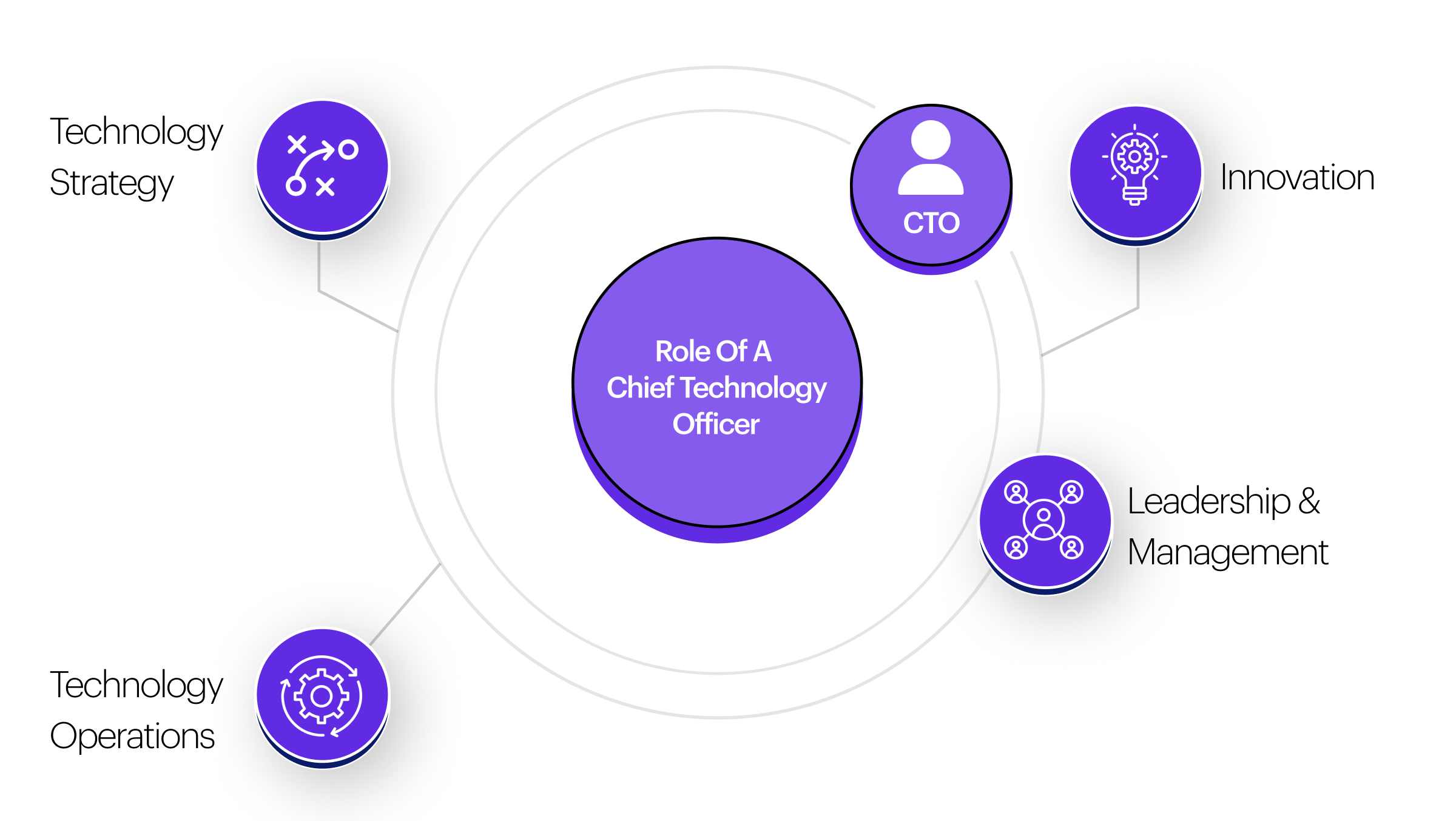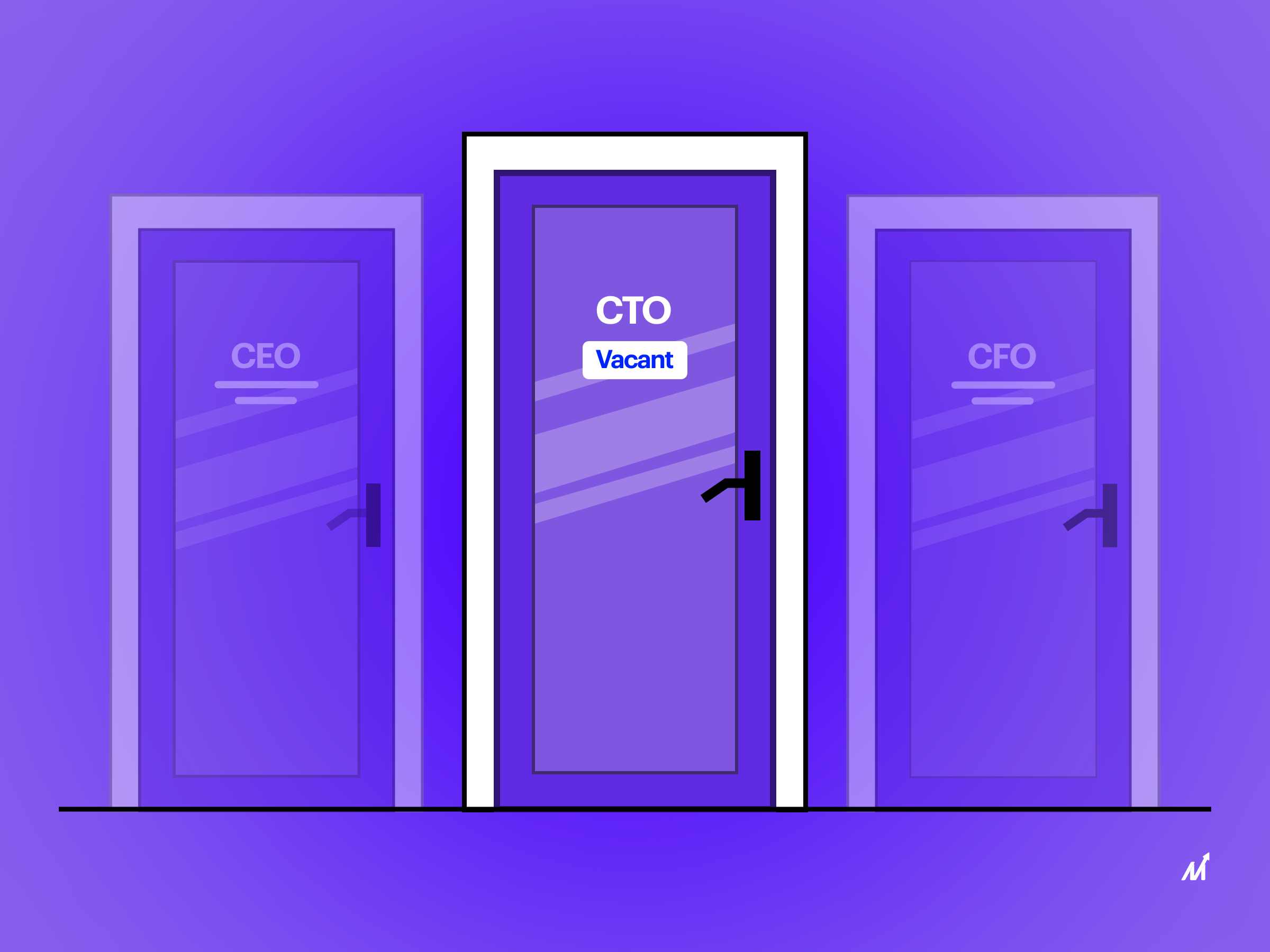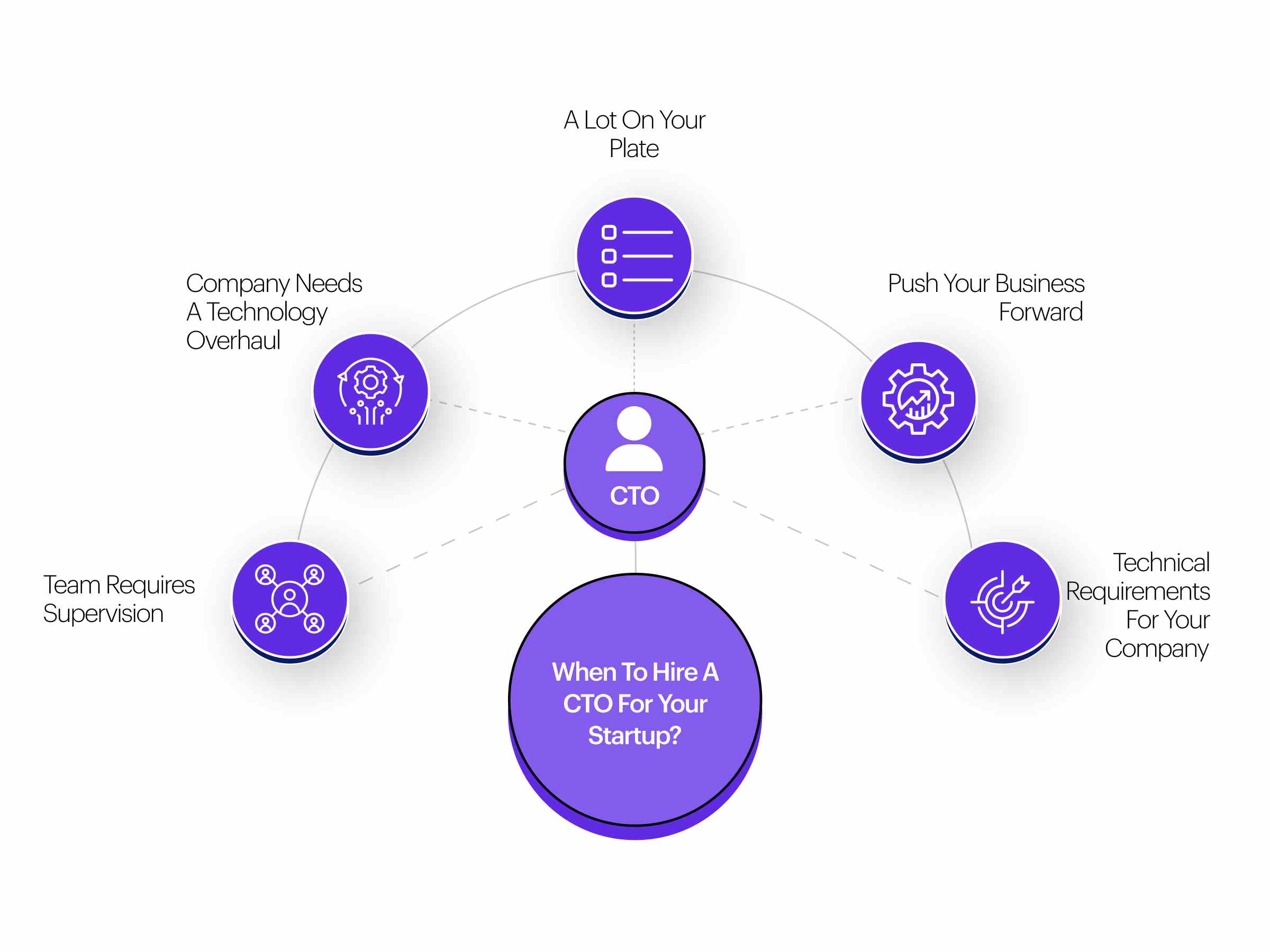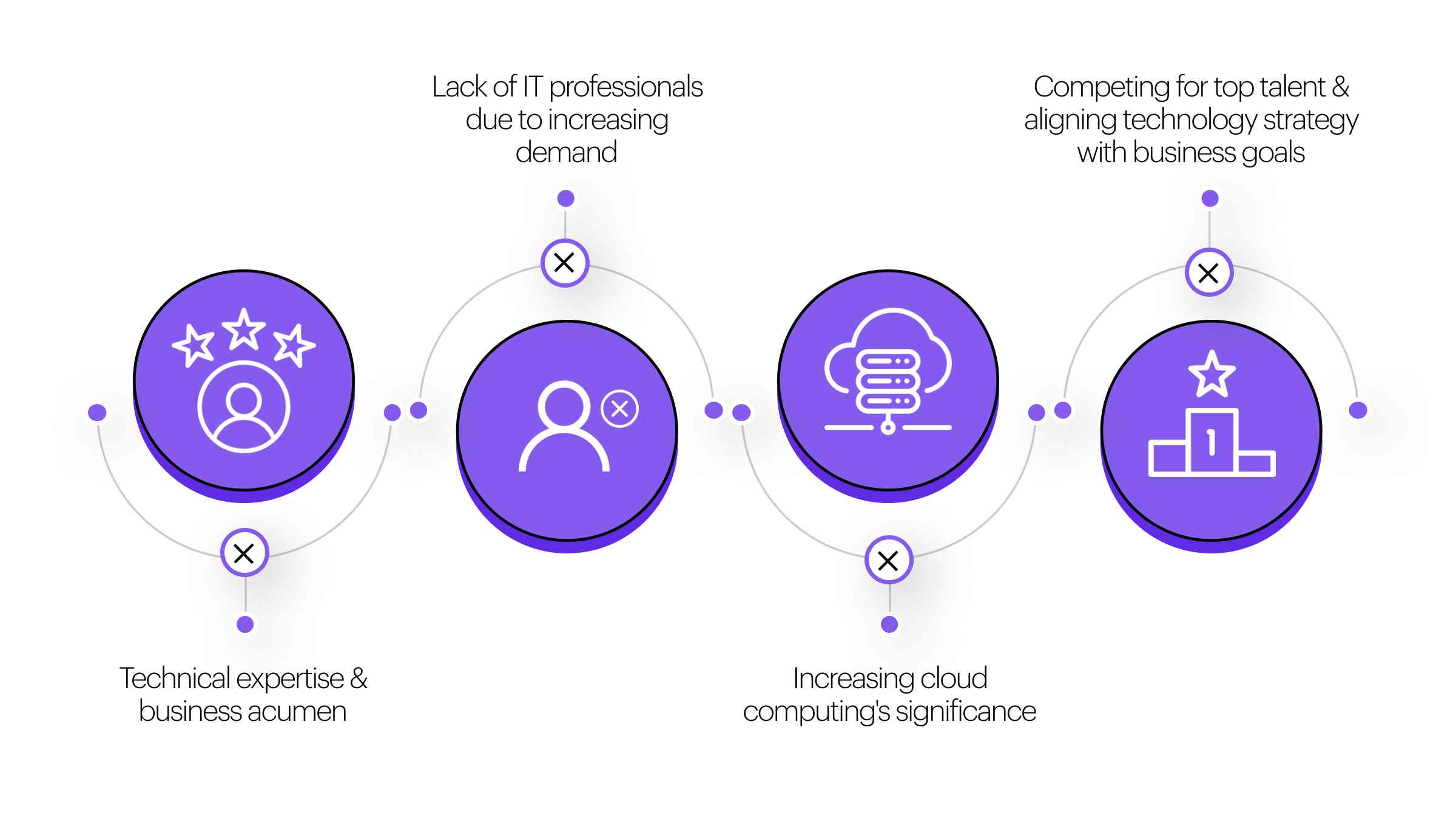A significant turning point in any startup’s development is hiring a chief technology officer (CTO). Yet it can also end up being expensive, tough, and challenging.
Finding a dedicated CTO might be challenging because senior and experienced tech expertise is becoming more exorbitant or scarce, and many startup founders come from non-technical backgrounds. Creating a solid shortlist on its own might be challenging.
Some experts contend that a CTO should be hired during the seed or Series A fundraising stage, while others assert that this should happen straight away.
This blog responds to three frequently asked issues about the Chief Technology Officer position for startups:
- When to hire a CTO?
- What are the challenges faced while hiring a CTO?
- How can a tech partner provide a CTO?
Overview Of Chief Technology Officer (CTO)
This is a C-level role that combines both technical and business expertise. In other words, a CTO aggregates the ideal software development teams and ensures that your business needs are mirrored in your product by maximizing the use of technology.
STXNext’s Global CTO Survey reports 51% of survey respondents joined startups as CTOs. A CTO serves as a technical and operational leader, among other things, but the role’s duties might change based on a business’s nature, requirements, and organizational structure.
Role Of A Chief Technology Officer (CTO)
A CTO oversees an organization’s technology operations and strategy. He ensures the company’s technology advances its business objectives and maintains its position as a leader in the sector. A CTO’s primary duties include the following:

- Technology Strategy: The CTO sets and executes the organization’s technology strategy, ensuring it’s in line with the aims and objectives of the business. This entails prioritizing technological efforts, creating roadmaps and goals, and evaluating and choosing new technologies.
- Technology Operations: The chief technology officer (CTO) is in charge of the company’s daily IT operations, ensuring that all systems function properly and that any problems are dealt with quickly. Data management, systems management, and infrastructure management are all included in this.
- Innovation: The chief technology officer (CTO) promotes innovation by researching cutting-edge developments and business prospects that could boost output and competitiveness. Creating and executing fresh technological approaches is part of this, as is encouraging an innovative work environment among the technology team.
- Leadership & Management: The CTO oversees and leads the IT team, ensuring they work towards the business’s goals. Setting performance goals, managing budgets and resources, and attracting and fostering talent are all included in this.
Responsibilities Of A CTO In Product Development
The chief technology officer’s primary goal in product development is ensuring that technology meets client needs while maintaining the company’s profitability. They help the team make technological choices to get to the intended site.
How can a CTO thrive in product development? Such a person must maintain equilibrium on three pivots:
- Technical capability
- Domain knowledge
- Great execution
Delivering a high-quality product on time depends on the integration of these competencies. To be more precise, an individual for the position of Chief Technology Officer should be knowledgeable about the following:
- Development of a roadmap and vision
- UI/UX user research
- DevOps
- Quality assurance
- Managing the development of a product
Ultimately, the CTO’s responsibility is to boost a company’s success by ensuring its technological operations and strategy align with its business objectives and competitive environment.
When To Hire A CTO For Your Startup?
It can be a game-changing choice to hire a CTO for your startup, putting your company on the right track to success. It is unrealistic to expect a founder to be an expert in every field, particularly regarding technology. That is why hiring a CTO you can confide in is essential.
An expert who understands operations and technology can assist you in managing your IT infrastructure, making intelligent decisions, and keeping up with market trends.
When to hire a CTO:
1. Your Software Development Team Requires Supervision
Although you’ve organized a fantastic software development team, you’re beginning to feel overwhelmed as your company expands. You are not certain that your team is on the right path, although they are working hard. Here, a talented CTO can genuinely make a difference. By sharing their enormous technical experience and knowledge, a competent CTO can offer your development team essential assistance and mentoring. Their assistance will allow your team to stay on plan and produce superior software your clients like.
A CTO can help you scale your IT systems as your company grows and becomes more competitive in the market to meet the expectations of your expanding customer base. They can also assist you in finding new possibilities to use technology to advance your business.
2. Your Company Needs A Technology Overhaul
Your business may need to upgrade if outdated technology or practices affect productivity. A significant technological improvement can be unnerving, though. A CTO can facilitate the transition while establishing long-term objectives to keep your business updated.
Your company must constantly remain at the forefront of its industry to succeed. This is especially true for businesses that often use new technology. The expertise of a CTO is crucial if staying current is a critical component of your company’s success.
3. A Lot On Your Plate
Consider a scenario where your business has grown to a point where it is stable and profitable, but you still need to push it further to enable it to scale up and expand. You can delegate some of the responsibility to a CTO.
To avoid over budget or dramatically altering your product’s design to attract more customers, a CTO can help your company develop technologically.
4. You’re Looking For Someone To Push Your Business Forward
Hiring a visionary chief technology officer can be the answer if your company isn’t expanding as quickly as you’d want. Using innovative technology to expand a business is a CTO’s essential task.
Your company can obtain insight and innovative methods that will enable you to disrupt the market by hiring a CTO.
5. The Technical Requirements For Your Company Are Colossal
It may be smart to hire a CTO if you lack the industry knowledge to complete a project. CTO may reduce the workload of the existing workforce.
A CTO can help your industry implement time-saving innovations and manage technology-related activities.
Hiring a CTO will ultimately depend on the demands and conditions of your startup. If you’re unsure, connecting with an experienced mentor or trustworthy advisor in the tech sector may be beneficial.
Why Your Startup Doesn’t Need A CTO?
A startup may not require a Chief Technology Officer (CTO) for several reasons, including the following:
- Limited Budget: It can be expensive to hire a CTO, especially for early-stage businesses with trouble surviving. A CTO’s salary, perks, and equity expenses can build up quickly and place a considerable financial strain on the company.
- Early-Stage Development: Building a minimum viable product (MVP) to test with customers and proving the business model should be the main priorities in the early stages of a startup. A CTO may not be required unless the company is ready to expand and needs more advanced technological solutions.
- Limited Technology Needs: Hiring a CTO might not be necessary if a startup’s technological requirements are simple and don’t require many development efforts. The founder or another team member can handle the company’s technical requirements instead.
- Shared Responsibility: Technology is no longer the exclusive purview of a single individual or group. Understanding technology and how it might influence business outcomes is becoming increasingly crucial for all startup stakeholders. A startup can avoid hiring a dedicated CTO by spreading the responsibility for technology throughout the entire team.
Hire A CTO: Top Challenges Faced
As a vital position that can significantly impact the success of a company’s technology strategy and innovation, hiring a Chief Technology Officer (CTO) can be a difficult and complex process.
Some of the top challenges faced while hiring a CTO include the following:
1. Technical Expertise & Business Acumen
Finding an individual with the appropriate technical knowledge to lead the IT team is one of the most challenging tasks. The CTO should thoroughly understand the company’s technological stack and can direct the team in creating and implementing the appropriate technical solutions.
Together with being technically adept, the CTO should have great business sense. The technological strategy should align with the company’s business objectives, which they should be aware of.
2. Lack Of IT Professionals Due To Increasing Demand
With the increased demand for IT specialists, one of the main issues businesses face is a lack of qualified personnel. Most companies nowadays are digital; thus, they need qualified individuals to manage their IT operations. As a result, talented IT specialists are in high demand.
Companies are willing to pay above-average rates for competent IT professionals. Still, the attrition rate makes it impossible to hold onto the talent for an extended period.
3. Increasing Cloud Computing’s Significance
Undoubtedly, cloud computing has become a part of how businesses work globally. It is ground-breaking, trustworthy, secure, and efficient. Most companies that have switched to a cloud infrastructure environment have already seen the value of the complete technology. It only occurs once everything has been taken care of, transported to the cloud, and integrated.
The most challenging aspect of adopting the cloud for CTOs is how they must employ cloud infrastructure to transform their business into a safe, long-lasting firm. Within it lies the actual challenge. You can have no latency because your competitors provide clients with better CTO services via cloud technology.
4. Competing For Top Talent & Aligning Technology Strategy With Business Goals
Top CTO candidates are in great demand; thus, businesses may need to compete with other companies to entice and keep the finest applicants. Offering competitive benefits and payment plans and fostering a positive work environment may be necessary to achieve this.
Understanding the company’s business objectives will help the CTO align the technological strategy. The CTO must be able to spot chances for innovation and growth because technology is constantly changing, which might be difficult.
Navigating the Challenges of CTO Recruitment: Strategic Approaches
The journey to identifying the perfect CTO can be fraught with challenges, including budget constraints and the precise technological expertise required for a startup. Below are some meticulously planned strategies for overcoming these obstacles.
1. Dual Role of CEO-CTO
In situations where the technological demand isn’t exceedingly complex, the CEO can assume the responsibilities of the CTO. This dual role mitigates the hurdles of recruitment and confidentiality agreements while optimizing the decision-making process concerning the technology. This approach demands extensive research and consultation on the part of the CEO but offers advantages such as direct oversight of technological choices and eliminating potential trust barriers between executives. It also allows the CEO to gain an in-depth understanding of the technology driving the startup.
2. Leveraging Outsourcing
For high-tech projects with limited financial resources, outsourcing becomes a viable strategy. This approach expands the available talent pool while optimizing costs—since compensation levels vary globally and don’t necessarily involve additional benefits like healthcare. Remote development teams can further reduce financial output, though this requires an adept approach to managing remote interactions and navigating any potential cultural differences. If the idea of a fully outsourced CTO feels too distant, nearshoring—a practice where services are outsourced to nearby countries—presents a compromise that combines proximity with cost-efficiency.
3. Senior Developers as Interim CTOs
Senior developers, with their acquired business acumen and risk mitigation skills, make excellent candidates for initial-stage CTO roles. They inherently understand the complexities of technological decisions and process optimization, offering invaluable insights in the startup’s formative phase. This does not necessarily commit them to a long-term engagement; post the technically intensive stages, startups can transition the role to someone with a more managerial focus, freeing the senior developer to revert to a purely coding role.
By strategically employing one of these options, startups can effectively address the challenges associated with filling the CTO position. Each approach has its unique benefits and drawbacks, but the choice should be driven by the startup’s specific needs, resources, and long-term vision.
How Can A Tech Partner Like Markovate Provide A CTO?
Employing a CTO from a technical partner for your startup is generally believed to be more goal-oriented, time-saving, and cost-effective. In this scenario, you employ a specialist company’s services that excel at technological improvement and provide “Hire a CTO-as-a-Service.”
By doing this, risks like employing the erroneous person, hiring someone with insufficient experience, hiring someone who operates slowly, and so on are significantly reduced.
Markovate can provide a Chief Technology Officer (CTO) in several ways. One common method is to offer (hire a CTO as a service), which involves providing a dedicated individual to manage the technical aspects of a company’s operations.
- We can also offer a full-time CTO to help with technical leadership and strategic planning.
- Another option is a fractional CTO who can work with a company on a part-time basis to help with technology strategy, team management, and other technical leadership tasks.
In contrast, we provide you with a team of experts who strictly adhere to your requirements and conditions, so you don’t just get employees that follow your orders but a partner that seems to care about your business and manages all technical aspects, ranging from strategy, preparing, designing and scaling platforms, to surveillance, coding, and so on, often at a far more affordable price.
Overall, We can provide CTOs with various engagement models that align with a business’s needs and budget, helping to accelerate their technology roadmap and achieve their business objectives.





